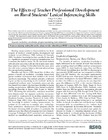The effects of teacher professional development on rural students’ lexical inferencing skills
Citation
Collins, G.G., Goforth, A.N., Ambrose, L.M. (2016) 'The effects of teacher professional development on rural students’ lexical inferencing skills.' 35(3), pp.20-29. DOI: 10.1177/875687051603500304

View/
Date
2016Author
Ambrose, Laura M.
Collins, Ginger G.
Goforth, Anisa N.
Peer Reviewed
YesMetadata
Show full item record
Collins, G.G., Goforth, A.N., Ambrose, L.M. (2016) 'The effects of teacher professional development on rural students’ lexical inferencing skills.' 35(3), pp.20-29. DOI: 10.1177/875687051603500304
Abstract
Rural students are at risk for vocabulary underdevelopment and often have less access to educational resources. The purpose of this investigation was to examine the effectiveness of an Internet-based Speech/Language Pathologist (SLP)-teacher consultation to support rural teachers’ vocabulary instruction to improve their students’ lexical inferencing skills. The investigators probed rural fourth-graders’ lexical inferencing skills three times throughout a semester. The experimental group’s teachers participated in SLP-teacher consultation, while the control group’s teachers did not. Although both groups demonstrated increases in lexical inferencing skills, there were significant differences in the groups’ error patterns. Clinical implications of these findings are discussed.
Keywords
VocabularyConsultation
Progress monitoring
Rural
Adolescent

